Related Research Articles
Patrick Joseph Buchanan is an American paleoconservative author, political commentator, and politician. Buchanan was an assistant and special consultant to U.S. presidents Richard Nixon, Gerald Ford, and Ronald Reagan. He is an influential figure in the modern paleoconservative movement in America.

Prescott Sheldon Bush was an American banker and Republican Party politician. After working as a Wall Street executive investment banker, he represented Connecticut in the United States Senate from 1952 to 1963.A member of the Bush family, he was the father of President George H. W. Bush, and the paternal grandfather of President George W. Bush and Florida Governor Jeb Bush.

Paul Dundes Wolfowitz is an American political scientist and diplomat who served as the 10th President of the World Bank, U.S. Deputy Secretary of Defense, U.S. Ambassador to Indonesia, and dean of Paul H. Nitze School of Advanced International Studies (SAIS) at Johns Hopkins University. He is currently a visiting scholar at the American Enterprise Institute.
The Union Banking Corporation (UBC) was a New York investment bank incorporated in 1924 in the United States. During World War II, under the U.S. Trading with the Enemy Act, the United States government seized the bank's assets pending investigation of the bank's business involving a former party member of the Nazi government in Germany, Fritz Thyssen. The now-former U.S. Senator Prescott Bush was a founding member and is included among its seven directors whose entire collective shareholdings in Union Banking Corp. were shares wholly owned by, and held on behalf of, the Thyssen empire's Bank voor Handel en Scheepvarrt in Rottendam. [1]

From January 14 to June 8, 2004, voters of the Democratic Party chose its nominee for president in the 2004 United States presidential election.

The New Hampshire presidential primary is the first in a series of nationwide party primary elections and the second party contest, the first being the Iowa caucuses, held in the United States every four years as part of the process of choosing the delegates to the Democratic and Republican national conventions which choose the party nominees for the presidential elections to be held in November. Although only a few delegates are chosen in the New Hampshire primary, its real importance comes from the massive media coverage it receives, along with the first caucus in Iowa.
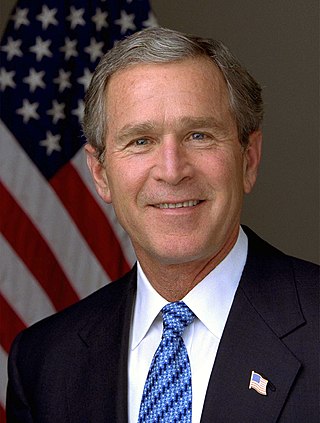
From January 19 to June 8, 2004, voters of the Republican Party chose its nominee for president in the 2004 United States presidential election. Incumbent President George W. Bush was again selected as the nominee through a series of primary elections and caucuses culminating in the 2004 Republican National Convention held from August 30 to September 2, 2004, in New York City.
The following is a timeline of events during the 2004 U.S. presidential election:
Joseph Charles Wilson IV was an American diplomat who was best known for his 2002 trip to Niger to investigate allegations that Saddam Hussein was attempting to purchase yellowcake uranium; his New York Times op-ed piece, "What I Didn't Find in Africa"; and the subsequent leaking by the Bush/Cheney administration of information pertaining to the identity of his wife Valerie Plame as a CIA officer. He also served as the CEO of a consulting firm he founded, JC Wilson International Ventures, and as the vice chairman of Jarch Capital, LLC.

Edwin Black is an American historian and author, as well as a syndicated columnist, investigative journalist, and weekly talk show host on The Edwin Black Show. He specializes in human rights, the historical interplay between economics and politics in the Middle East, petroleum policy, academic fraud, corporate criminality and abuse, and the financial underpinnings of Nazi Germany.

The 2004 United States presidential election was the 55th quadrennial presidential election, held on Tuesday, November 2, 2004. The Republican ticket of incumbent President George W. Bush and his running mate incumbent Vice President Dick Cheney were elected to a second term, defeating the Democratic ticket of John Kerry, a United States senator from Massachusetts and his running mate John Edwards, a United States senator from North Carolina. As of 2020, this is the only presidential election since 1988 in which the Republican nominee won the popular vote and the only presidential election since 1984 in which the incumbent Republican president won re-election. Bush also became the only incumbent president to win re-election after previously losing the popular vote. He was the second sitting President in a row to win a second term.
David Emory is an American talk radio host and conspiracy theorist, born in New York City, based in the San Francisco Bay Area. Self-described "anti-fascist researcher", he is known for his radio show which purports to uncover neo-fascism and neo-Nazism; among his more notable claims is that the Bush family was connected to the Third Reich.
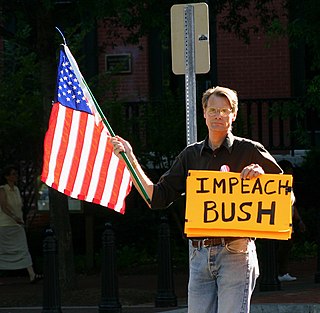
During the presidency of George W. Bush, several American politicians sought to either investigate Bush for possible impeachable offenses, or to bring actual impeachment charges on the floor of the United States House of Representatives Judiciary Committee. The most significant of these efforts occurred on June 10, 2008, when Congressman Dennis Kucinich, along with co-sponsor Robert Wexler, introduced 35 articles of impeachment against Bush to the U.S. House of Representatives. The House voted 251 to 166 to refer the impeachment resolution to the Judiciary Committee on June 11, where no further action was taken on it. Bush's presidency ended on January 20, 2009, with the completion of his second term in office, rendering impeachment efforts moot.

Robert M. Bowman was a former director of advanced space programs development for the U.S. Air Force in the Ford and Carter administrations, and a former United States Air Force lieutenant colonel with 101 combat missions. He received a Ph.D. in aeronautics and nuclear engineering from the California Institute of Technology.
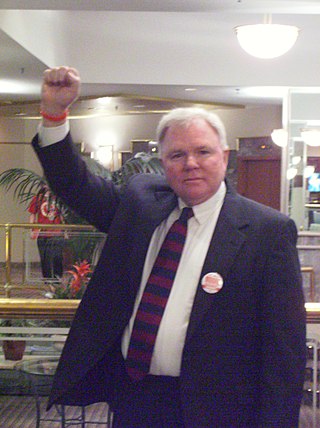
Brian Patrick Moore is an American politician and founder of antiwar organization Nature Coast Coalition for Peace & Justice. A perennial candidate, he was the presidential nominee of the Socialist Party USA for the 2008 United States presidential election; he waged several campaigns for mayor and city council in Washington, D.C., and twice ran for the United States House of Representatives from Florida's 5th congressional district, winning none; he ran for the Democratic Party nomination for Governor of Florida in 2010, but lost in the primary election.
The 2008 presidential campaign of Tom Tancredo, a Congressman from Colorado began on April 2, 2007 with a formal announcement. The campaign garnered grassroots support and endorsements from conservative Republicans concerned about illegal immigration and border security. However, Tancredo remained low in the polls and was criticized for his nativist campaign, which had been described as "single-issued." Tancredo stated that he probably would not win the nomination but hoped his campaign would bring forth more debate on his issue of concern, immigration. On December 20, 2007 Tancredo withdrew from the presidential race, and endorsed Mitt Romney.
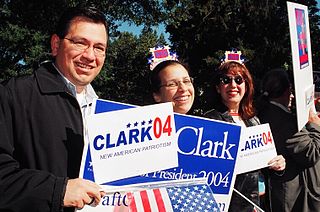
The 2004 presidential campaign of Wesley Clark, a retired U.S. Army general who served as Supreme Allied Commander Europe (SACE) from 1997 to 2000, officially began on September 17, 2003. A movement to draft Clark for the Democratic nomination began in April 2003, and was led by activists who felt Clark's military service and criticism of the War in Iraq made him a strong candidate. Prior to announcing his campaign, Clark was not known to have publicly identified with either party.
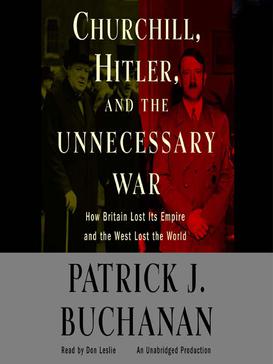
Churchill, Hitler and the Unnecessary War: How Britain Lost Its Empire and the West Lost the World is a book by Patrick J. Buchanan, published in May 2008. Buchanan argues that both world wars were unnecessary and that the British Empire’s decision to join the wars had a cataclysmic effect globally. One of Buchanan's expressed purposes is to undermine what he described as a "Churchill cult" in America's elite. Buchanan focuses particularly on how Winston Churchill helped influence Britain into the world wars with Germany in 1914 and in 1939.
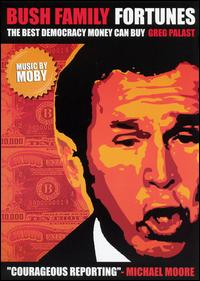
Bush Family Fortunes: The Best Democracy Money Can Buy is a 2004 documentary film directed by Steven Grandison and Greg Palast. The film, which examines various aspects of the presidency of George W. Bush, including the 2000 US presidential election and the Iraq War, is adapted from the 2003 BBC production Bush Family Fortunes and based on the 2002 book The Best Democracy Money Can Buy by investigative journalist Palast, who had spent years tracking the Bush family for the BBC and The Guardian newspaper. The research for the original BBC film, which claims to have exposed the George W. Bush military service controversy, was also drawn upon by Michael Moore for Fahrenheit 9/11 (2004) and footage was used by Robert Greenwald in Unprecedented: The 2000 Presidential Election (2002).

The 2000 presidential campaign of Alan Keyes, former Assistant Secretary of State for International Organization Affairs from Maryland began when he formed an exploratory committee, simply called Keyes 2000, on June 17, 1999, with a formal announcement on September 21, 1999 in Bedford, New Hampshire. He ran in the 2000 presidential primaries, opposing Texas governor George W. Bush and Arizona Senator John McCain for his party's nomination. Keyes campaigned as a more ideologically consistent candidate than John McCain, taking right-wing positions on issues, including abortion, gun control, and government spending.
References
- ↑ New York Press , Who leads the '04 fringe candidates?
- 1 2 Campbell, Duncan (2004-09-25). "How Bush's grandfather helped Hitler's rise to power". The Guardian. London. Retrieved 2010-05-06.
- ↑ "John Buchanan Documents". History News Network. 2003-11-17. Retrieved 2007-10-19.
- ↑ Salant, Jonathan (2003-10-17). "Documents: Bush's Grandfather Directed Bank Tied to Man Who Funded Hitler". FOX News Network, LLC. Archived from the original on 2006-05-09. Retrieved 2007-10-19.
- ↑ Buchanan, John; Michael, Stacey (2003-11-07). ""Bush - Nazi Dealings Continued Until 1951" - Federal Documents". The New Hampshire Gazette. Archived from the original on 2003-11-19. Retrieved 2007-10-19.
- 1 2 Jonas, Jillian (January 25, 2004). "Challenge by 'honest Republican'". United Press International . Retrieved 2009-03-06.[ dead link ]
- ↑ Archive of John Buchanan.org On September 1, 2000, before Mr. Bush took office, the Project for a New American Century proposed the invasions, without provocation or attack, of Afghanistan and Iraq. The motive? 'to protect America's oil interests.' The signatories to that sinister plan - Dick Cheney, Paul Wolfowitz, and Richard Perle, to name but a few – cleverly and dishonorably set the stage for all that would follow, including the horrifying spectacle of 9/11, when they noted that since well-fed and materially-comfortable Americans would lack the will and focus to fight such 'interventionist' wars - now known as 'The Bush Doctrine' - there must be a galvanizing incident on the order of Pearl Harbor.
- ↑ Berg-Andersson, Richard (2004-01-27). "2004 Presidential Primaries, Caucuses, and Conventions". The Green Papers. Retrieved 2007-10-19.
- ↑ politics1.com, Archived July 9, 2009, at the Wayback Machine
- ↑ Poison pen or brave crusader? Small-town editor at odds with officials Atlanta Journal-Constitution Dec 18, 2005